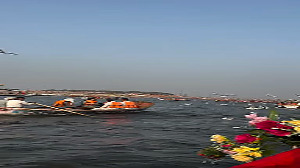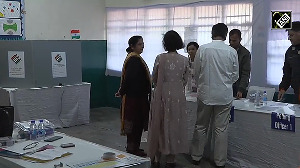
General Ved Prakash Malik, former Chief of the Army Staff (1997 to 2000) and Chairman, Chiefs of Staff Committee (January 1999 to September 2000), is best known for leading Operation Vijay in May-July 1999 in Kargil, which forced the Pakistani army to vacate the heights they had captured on Indian territory.
After retirement, the former member of the National Security Advisory Board has been active in public life writing and lecturing on national security issues.
In an exclusive chat with Senior Editor Sheela Bhatt, General Malik spoke about why he endorses the recent election in Iraq while disagreeing with the American military doctrine which was adopted after the capture of Baghdad.
I would like to commend the American political authorities as well as the military authorities for the very determined way that they have gone through this election despite those entire setbacks they have taken in. Most people didn't think the election would take place on schedule. This shows their determination. Yes, the credibility of the election is being questioned at many places. My own view is better to have something than to have nothing. What was the alternative to this election?
I wish the Americans will hand over the complete responsibility to the new government. Now, everyone will watch how much of the decision- making in political and military spheres will be handed over to the new government.
Iraq:'No foreign troops in 18 months'
This does not mean that American military will just walk out. I am sure even the new Iraqi government will not like them to leave. The American forces -- may be in smaller numbers -- will have to stay back in Iraq. We hope the newly elected government will be accountable to people and the Americans will support it as they support Hamid Karzai's government in Afghanistan.
In Iraq, the world is witnessing the alternative to Saddam Hussein, a government which is democratically elected. Now, it is for them to choose what kind of friendship and cooperation they want from the US. I agree with the view that this regime change has come at a heavy cost. The Americans feel that in West Asia they have been able to introduce a democratic regime which is not a small achievement.
The process to this day (installing democratic form of government) has been a violent one. Violence has taken place because that was the path chosen by American politicians.
US will withdraw forces if new Iraqi govt asks: Bush
I have told American audiences that I don't agree with the American military doctrine which was adopted after the capture of Baghdad. I wish they had adopted the doctrine of minimum use of force. I feel outraged at the way they have got so many casualties. They should not have used force in the manner they have used it.
When they are talking about human rights violations committed by other countries, they should follow human rights themselves. It will cause alienation not only in Iraq but all over the world amongst the Muslims.
Although it is a matter of opinion, in such a situation they should have adopted the doctrine that the Indian army follows. We have always assured that minimum collateral damage is done. More importantly, you should not alienate people. Unfortunately, the US military has been using excessive force. As a result of that they have large collateral damage and have alienated the Iraqi people. Maybe, the American military doesn't have that kind of experience as we have in such situations.
The military doctrine they followed in Fallujah or Mosul is not something that I commend. In our doctrine it is enshrined to make sure that minimum force is used. Whether it is in the North-east or Punjab or Kashmir we consider insurgents our own people. After the capture of Baghdad, the Iraqis should have been treated as their own people. The Americans had responsibility for Iraq after capturing Baghdad. When they alienated people insurgents grab the opportunity to come up.
Interview: V P Malik on Kargil
Conflict resolution has to be kept in mind when you are operating in troubled areas. Local commanders should know about the resolution of the conflict that they are aiming at.
Also, terrorists can't function without local support, that is why it is important to not alienate people. I was against sending of Indian troops to aid the Americans. In retrospect, I feel India took the right decision by not sending troops to Iraq. We were lucky that in our country democracy came without any violence. Our armed forces remain apolitical. I am advocating once again that US or Iraqi military forces now must remain apolitical. They must not interfere or impose their will on the newly elected Iraqi government.
I strongly feel the newly elected government in Iraq should seek multinational cooperation through the United Nations. That will be good for both Iraq and America.
If the new government in Baghdad takes the UN approach to peacekeeping and peace enforcement, many government in the worlds will rethink about sending troops to Iraq. But unless that happens, I can't see India sending troops to Iraq.
In Iraq stability will not come so soon. The new government will be under watch to see how it establishes its credibility. I don't think America will be out of Iraq in the near future.






 © 2025
© 2025